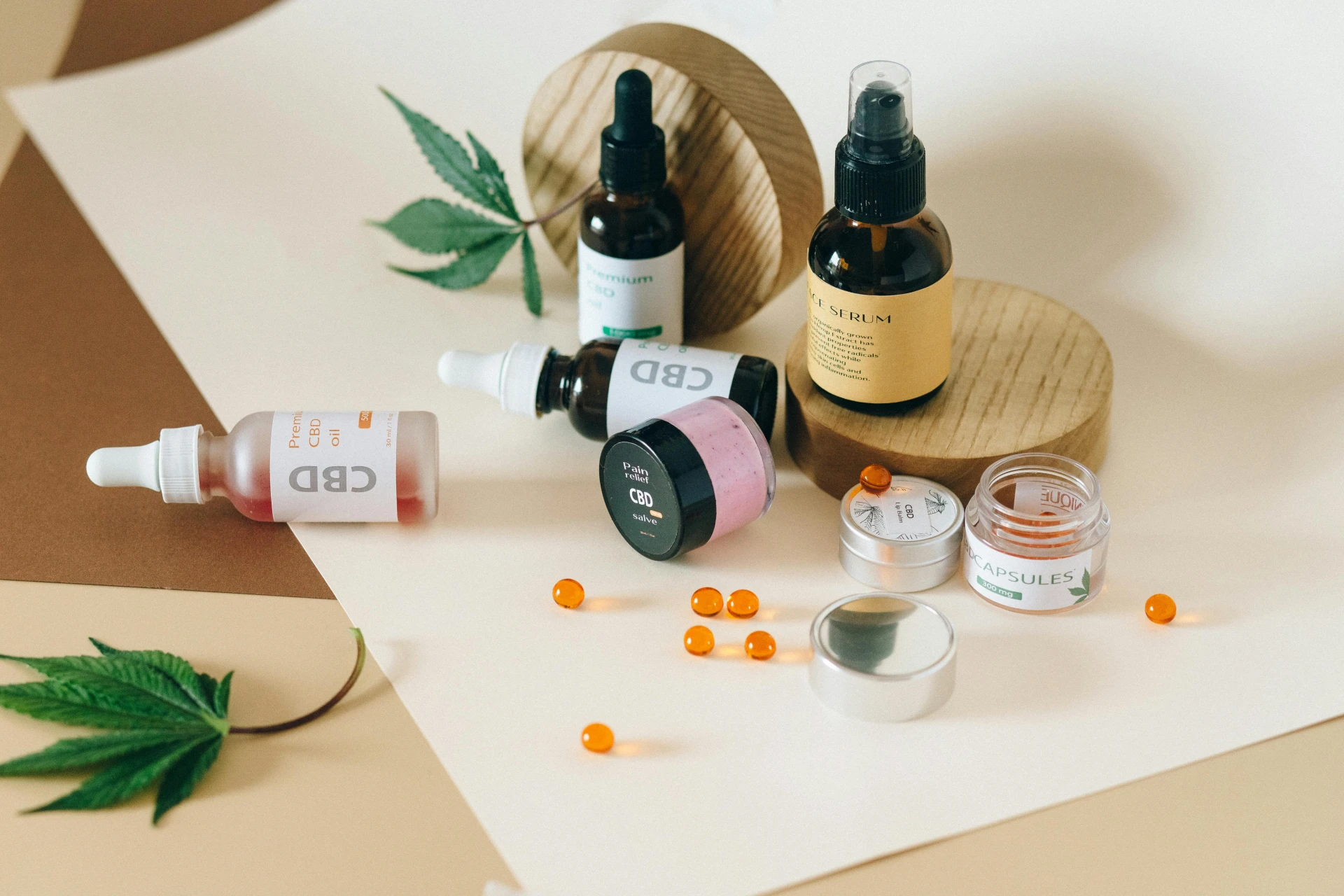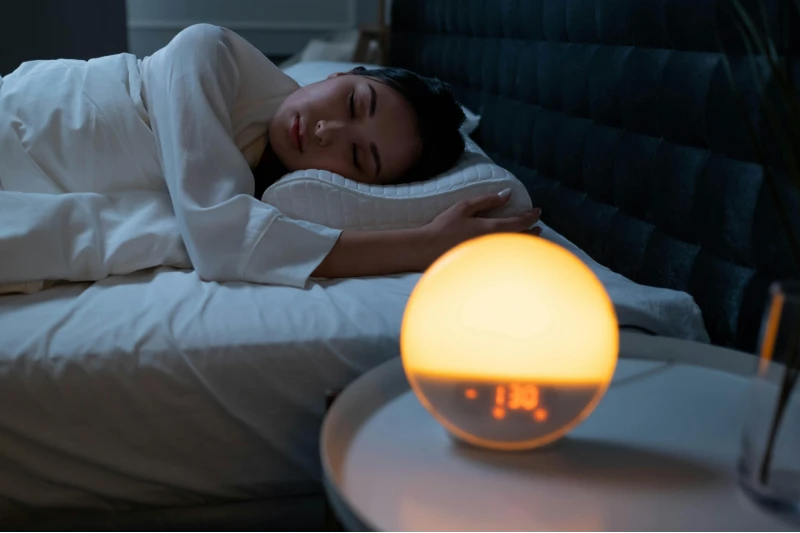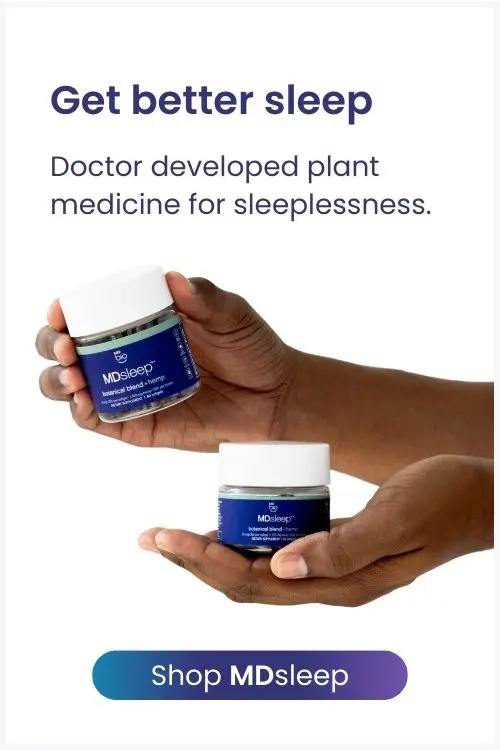

PhotoCredit_Nataliya Vaitkevich_pexels
Struggling to get a good night’s sleep and searching for natural solutions? Many people are unaware of how cannabis can influence sleep quality. Ignoring this could lead to ongoing sleep issues, fatigue, and poor overall health.
Understanding how cannabinoids like THC, CBD, CBN, and CBG interact with the endocannabinoid system can reveal effective ways to improve sleep, especially when combined with other calming herbs.
Understanding Cannabis and Sleep
The Endocannabinoid System
The endocannabinoid system (ECS) is a complex cell-signaling system that regulates various functions, including sleep. It consists of receptors, endocannabinoids, and enzymes. The primary receptors, CB1 and CB2, are found throughout the body.
CB1 receptors are crucial for sleep regulation, as they are located in the brain. Cannabinoids from cannabis interact with these receptors to influence sleep patterns. Enhancing ECS function can lead to improved sleep quality and duration.
Cannabinoids Overview
Cannabinoids are the active compounds in cannabis, with more than 100 identified. Tetrahydrocannabinol (THC) and Cannabidiol (CBD) are the most well-known. Each cannabinoid interacts uniquely with the ECS.
THC induces sleep by binding to CB1 receptors, while CBD affects serotonin levels and anxiety. Cannabinoid combinations can lead to an “entourage effect,” enhancing their overall sedative properties.
Learn More about from our targeted Cannabis Guides:
THC for Sleep
THC is well-recognized for its sedative effects, making it practical for individuals with insomnia. It reduces the time it takes to fall asleep. THC increases slow-wave sleep, which is the deepest stage of sleep. However, higher doses of THC may lead to REM sleep suppression, affecting dreams.
People should consider dosage carefully to balance sleep benefits and reduce potential side effects like grogginess.
CBD for Sleep
CBD offers a non-intoxicating alternative for improving sleep. It is known for its calming properties, which may reduce anxiety—a common barrier to restful sleep. Unlike THC, CBD does not suppress REM sleep. Instead, it may increase sleep duration and improve sleep quality through anxiety-reducing effects.
It is ideal for those who prefer to avoid THC’s psychoactive effects.
CBN for Sleep
CBN is a lesser-known cannabinoid gaining interest for its sedative qualities. Formed as THC oxidizes, CBN is mildly psychoactive. It is sometimes dubbed the “sleep cannabinoid” due to its potential to prolong sleep duration.
When combined with THC, it may enhance sedative effects. Although more research is needed, initial findings suggest that CBN may be beneficial for those struggling with sleep disorders.
CBG for Sleep
CBG (Cannabigerol) is another non-intoxicating cannabinoid found in cannabis. While it is primarily known for its potential anti-inflammatory and antibacterial properties, CBG also interacts with the ECS to possibly induce relaxation. Its role in promoting sleep is still being studied.
Nevertheless, its calming effects may contribute to a more restful night’s sleep alongside other cannabinoids like THC and CBD.
Cannabis Combined with Herbs for Sleep
Cannabis and calming herbs can enhance sleep, such as valerian root, chamomile, and lavender. These herbs have historically been used as natural sleep aids. Valerian root, for example, can help reduce sleep latency, while chamomile may alleviate anxiety.
Lavender promotes relaxation. Combining these with cannabis may result in a synergistic effect, potentially boosting the sedative properties of cannabis.
Full Spectrum Hemp in MDsleep + Hemp Sleep Aid
Full-spectrum hemp includes all naturally occurring cannabinoids, terpenes, and flavonoids found in cannabis. This helps achieve the entourage effect, enhancing the product’s sleep-inducing properties. MDsleep + Hemp Sleep Aid uses full-spectrum hemp to leverage these compounds synergistically.
Retail products offering full-spectrum hemp can provide comprehensive support for sleep improvement, making them more effective than isolated compounds.
Key Ingredients of MDsleep + Hemp Sleep Aid
The MDsleep + Hemp Sleep Aid formula features a blend of cannabinoids and herbal extracts designed to aid sleep. Cannabinoids like CBN and CBD are included for their sleep-promoting properties. Herbal extracts such as passionflower and magnolia bark complement the cannabinoids.
These ingredients work together to calm the mind, relax the body, and facilitate a more restful night’s sleep.
Clinically Proven MDsleep + Hemp Sleep Aid Designed by Doctors
MDsleep + Hemp Sleep Aid is designed by doctors and based on clinical research. Its formulation is intended to address common sleep disturbances. Clinically tested ingredients aim to balance neurotransmitters related to sleep.
Research supports the efficacy of combining cannabinoids with specific herbs to enhance sleep. This product reflects a scientifically informed approach to safely supporting better sleep.
Indica, Sativa, and Hybrid Strains for Sleep
When it comes to improving sleep quality, cannabis strains can be categorized primarily into Indica, Sativa, and Hybrid. Indica strains are typically known for their relaxing effects, while Sativa strains may offer more uplifting benefits. Hybrid strains combine elements of both to cater to specific needs.
Terpenes and Sleep Induction
Cannabis terpenes like myrcene and terpinolene are key in promoting relaxation and aiding sleep. Myrcene is often found in Indica strains and is known for its sedative properties, helping to unwind the body and prepare it for rest. Strains high in myrcene might be particularly beneficial for those seeking relief from insomnia.
Terpinolene, though less common, is also valued for its calming effects. Its presence in certain cannabis strains can enhance the overall relaxing experience, making it easier for users to drift off into a restful sleep. Strains like the Northern Lights are popular, as they blend these terpenes effectively with other sleep-promoting compounds.
Why MDsleep is the Best Cannabis for Sleep Formula
MDsleep offers a cannabis-infused solution using hemp designed for enhanced sleep quality. The formula has undergone rigorous testing, ensuring a blend that promotes restful sleep. Users have reported significant improvements, experiencing fewer wakeful moments and more consistent sleep cycles.
Key Features:
- Rigorously Tested: The components of MDsleep have been extensively evaluated to ensure efficacy in improving sleep.
- All-Natural Ingredients: The formula incorporates a selection of botanicals known for their calming properties, complemented by the soothing effects of cannabis.
Benefits of Using MDsleep:
- Reduction in Restlessness: Consumers often note a decrease in night-time disruptions, attributing this to the supplement’s balanced formulation.
- No Morning Drowsiness: One of the standout features is its ability to prevent grogginess the next day, which many users appreciate.
Customer Praise:
MDsleep has garnered positive reviews, rated 4.7/5 based on 284 reviews. Customers frequently cite the product’s consistency and effectiveness in aiding sleep without unwanted side effects.
Accessibility:
Available in both 2-week and 4-week supplies, it offers flexibility for different usage needs, ensuring users can find a convenient solution that fits their lifestyle.
MDsleep’s balanced approach and dedication to quality make it a top contender in the realm of cannabis-based sleep aides, especially for individuals seeking a natural and effective remedy for insomnia.
Shop MDsleep
Find sleep aids that were designed by doctors and validated by research.
Cannabis Consumption Methods
Cannabis can be consumed in various forms, each offering different effects and absorption rates. These methods include inhalation, edibles, topicals, and tinctures, each contributing uniquely to the experience and efficacy of cannabis for sleep.
Inhalation: Smoking and Vaping
Inhalation through smoking or vaping provides a rapid onset of effects, making it a popular choice for individuals seeking immediate relief. Smoking involves combusting cannabis flowers, while vaping heats cannabis oil or flowers at a lower temperature. This method is known for its quick absorption as cannabinoids enter the bloodstream through the lungs.
Smoking can produce harshness and odor and may have long-term health implications due to combustion. Vaping, on the other hand, is often perceived as a less irritating option, potentially presenting fewer respiratory risks. Consumers seeking fast-acting effects may choose either method, though they should weigh potential health considerations.
The choice between smoking and vaping frequently comes down to personal preference and convenience.
Edibles and Oral Consumption
Edibles offer a discreet and long-lasting option for consuming cannabis. When ingested, THC and other cannabinoids first pass through the digestive system, resulting in slow absorption through the liver. This can delay the onset of effects for 30 minutes to 2 hours.
Once active, these effects can last several hours, providing sustained relief. Popular forms of edibles include gummies, chocolates, and baked goods. It’s essential to consider dosage and start with low amounts, as the effects are more potent than other methods.
Additionally, inexperienced users should be cautious of overconsumption due to delayed onset. With controlled use, edibles can offer a reliable and enduring experience.
Topicals and Transdermals
Topicals and transdermals offer restricted absorption of cannabinoids through the skin, making them ideal for targeting localized pain or inflammation rather than systemic effects. Available in creams, balms, and patches, these products typically contain CBD and are less likely to produce psychoactive effects.
While topicals remain on the skin’s surface, transdermal patches are designed to deliver cannabinoids into the bloodstream for a more systemic effect. Ideal for users interested in direct application to specific areas, these methods offer a non-intoxicating alternative.
Transdermals may also offer sleep aid benefits if designed for systemic absorption. In both cases, the process of application is straightforward and precise.
Tinctures and Sublinguals
Tinctures and sublinguals provide a flexible and efficient method for consuming cannabis. Placed directly under the tongue, cannabinoids are absorbed through mucous membranes, offering rapid onset within 15-30 minutes. The sublingual method bypasses the digestive system, producing faster effects than edibles.
Tinctures often come with marked droppers for precise dosing, allowing users to titrate their intake easily. These liquid extracts can be added to food or beverages, contributing to versatility in consumption. The discreet nature of tinctures makes them practical for those seeking controlled and quick effects, particularly as a sleep aid where timing is crucial.

Optimizing Cannabis for Better Sleep
To maximize the sleep-inducing effects of cannabis, it is crucial to consider aspects such as the correct dosage, timing of consumption, possible interactions with other sleep aids, and awareness of potential side effects. Each of these factors plays a significant role in enhancing sleep quality.
Dosage Considerations
Finding the correct dosage is key to using cannabis effectively for sleep. Lower doses may help some individuals relax, while others may require higher doses for sedative effects. It’s important to note that everyone’s tolerance and reaction can vary.
Starting with a small dose and gradually increasing until the desired effect is achieved is a practical approach. This method helps to avoid potential adverse reactions.
Both THC and CBD have roles in promoting sleep, with CBD often appreciated for its calming properties. Keeping ratios in mind can guide those who are sensitive to THC-related psychoactive effects.
Experimentation may be needed to find the best balance.
Timing of Consumption
The timing of cannabis consumption can significantly impact its effectiveness as a sleep aid. Consuming cannabis 30 to 60 minutes before bedtime often allows the relaxing effects to coincide with natural sleep cycles. This timing can vary based on the method of intake.
Edibles generally take longer to produce effects compared to smoking or vaping. Ingesting cannabis via edibles might require planning about 1-2 hours before sleep. Users might have to adjust timing and method to match their sleep preferences and schedules, ensuring the effects peak during desired sleep periods.
Interactions with Other Sleep Aids
Cannabis can interact with other sleep aids, both over-the-counter and prescription medications. Combining cannabis with certain medications might enhance sedative effects, potentially leading to excessive drowsiness or unintended side effects.
It is advisable to consult a healthcare professional before combining cannabis with other sleep-inducing substances. Understanding these interactions is essential, especially for those taking medications such as opioids, which can have dangerous effects when mixed with cannabis. Safe and informed use should always be a priority.
Potential Side Effects
While cannabis can be beneficial for sleep, users should be aware of possible side effects. Common side effects include dry mouth, dizziness, and appetite changes. High doses, particularly of THC, can lead to increased anxiety or paranoia in some individuals.
Adjusting dosage and monitoring personal reactions can minimize these side effects. Long-term or chronic use may also contribute to dependency, highlighting the importance of using cannabis responsibly. Recognizing and understanding these potential side effects can help individuals use cannabis more effectively as a sleep aid.

Research and Studies
Scientific investigation into the effects of cannabis on sleep has gained momentum due to increasing interest in its medical applications. The key focus areas include clinical evidence from existing studies and ongoing research into potential therapeutic roles for sleep disorders.
Clinical Evidence
Recent studies indicate that cannabis may play a beneficial role in managing sleep disorders. Medical cannabis has been increasingly used for conditions like insomnia, with some research noting improvements in patient-reported sleep scores. For example, research conducted in Canada highlights cannabis’s positive impact on sleep quality.
However, it’s important to note the variability in results due to factors like sample size and research methodologies. Several studies evaluate the effects of cannabinoids such as THC and CBD on sleep. THC is generally associated with sleep induction, while CBD may help improve sleep duration and reduce sleep disturbances.
Some clinical trials have observed improvements in conditions like restless legs syndrome and sleep apnea, which can contribute to better overall sleep quality.
Ongoing Research
Ongoing research continues to explore the therapeutic potential of cannabis in sleep management. Legalization trends and increased interest in cannabis-derived products have spurred further investigations into their efficacy. Future studies should focus on more precise dosing, diverse patient demographics, and long-term effects.
Significant studies, such as those reviewed by the Michael G. DeGroote Centre for Medicinal Cannabis Research, aim to address the limitations of past research, including small sample sizes and subjective measurements. New research explores less common sleep disorders like narcolepsy and parasomnias, broadening the scope of potential benefits.
These studies could pave the way for optimized therapies that incorporate cannabis to improve sleep.
Frequently Asked Questions
Various aspects of using cannabis for sleep include understanding the effectiveness of certain combinations, identifying the best Indica strains, and recognizing the role of potency in sleep aid. Safe consumption levels and the differing impacts of edible versus inhaled cannabis are also essential to consider.
Why is the combination of GABA, L-theanine, and Cannabis more effective for sleep?
The synergy between GABA, an inhibitory neurotransmitter, and L-Theanine, an amino acid, can enhance relaxation. When combined with cannabis, which has sedative properties due to its cannabinoids, this combination may improve sleep induction and quality more effectively compared to using one of these components alone.
What Indica strains are considered most effective for improving sleep quality?
Indica strains known for promoting better sleep include Granddaddy Purple and Northern Lights. These strains often feature higher sedating compounds, which may foster relaxation and support longer sleep durations. They are commonly chosen for their ability to calm the body and mind.
How does the potency of a cannabis strain impact its ability to aid sleep?
A strain’s potency, determined by its cannabinoid content, can significantly affect sleep. Higher THC levels may induce sleep more rapidly, while balanced THC-CBD ratios can help maintain sleep without causing excessive sedation. Potency must be tailored to individual tolerance and needs.
What are the potential effects of using cannabis on sleep cycle or sleep patterns?
Cannabis can alter sleep architecture by reducing REM sleep and increasing deep sleep. This shift may result in fewer dreams and potentially more restful sleep. However, prolonged use might affect natural sleep patterns, leading to dependency for initiating sleep.
Are there any particular cannabis products recommended for promoting better sleep?
Products like tinctures, capsules, and edibles specifically formulated for sleep are often recommended. These may contain relaxing terpenes and cannabinoids like CBN or CBD, which can enhance sedative effects without the psychoactive impact of THC.
How often is it safe to use cannabis as a sleep aid without adverse effects?
Regular use should be approached cautiously. It is advisable to limit cannabis use to occasional or as-needed situations. This minimizes the risk of dependency and tolerance buildup, ensuring the natural sleep cycle is not disrupted, and effectiveness is maintained.
Can using edible cannabis products improve sleep differently than smoking or vaping?
Edible cannabis products offer a delayed and longer-lasting effect compared to smoking or vaping. Due to this, edibles may provide prolonged sleep support with a gradual onset. However, they are metabolized differently, and dosing can be less predictable, requiring careful adjustment.

Kia Michel, MD
Physician
Kia Michel, MD is an urologist and staff surgeon at Cedars-Sanai Medical Center in Los Angeles. As a founding member of Comprehensive Urology in Beverly Hills, he believes in treating all aspects of a patient’s wellbeing in order to achieve optimal health. After 25 years in private practice, Dr. Michel believes that a good night’s sleep is essential to maintaining your health, which inspired him to co-create the MDsleep community and the Sleep Doctors Blog.
What Our Readers Say
“Thanks to the insightful articles, I’ve finally managed to get back to my old sleep routine. I feel more rested and energetic each day!”
“The blog’s advice on sleep hygiene has been a game-changer for me. I never realized how small changes could make such a big difference.”
“I struggled with insomnia for years, but the tips I found here have helped me sleep through the night consistently. Thank you!”
“I no longer feel like a zombie from The Walking Dead series! I finally have my life back.”
Stay Updated with Our Newsletter
Join our community of sleep enthusiasts! Subscribe to receive the latest blog posts and exclusive sleep tips straight to your inbox.
Follow Us for More Sleep Insights
Discover Better Sleep Solutions
Unlock the secrets to a restful night by exploring our expert-backed articles and join our vibrant community for personalized sleep tips.
List of References
- AASM Sleep Prioritization Survey: This survey by the American Academy of Sleep Medicine examines the use of melatonin among the public. It reveals trends and insights into how melatonin influences sleep patterns. For more information, visit AASM Sleep Prioritization Survey, Melatonin Use.
- Melatonin Overview: The A.D.A.M. Medical Encyclopedia provides a detailed entry on melatonin, discussing its role as a natural hormone and its applications in treating sleep disorders. More details can be found at Melatonin – MedlinePlus.
- Cannabinoids and Sleep: A study by Kaul, Zee, and Sahni reviews the effects of cannabinoids on sleep and their potential therapeutic roles in managing sleep disorders. This research can be accessed through Neurotherapeutics.
- Insomnia and Substance Use Disorders: Arnedt discusses insomnia in individuals with substance use disorders, highlighting how these conditions interact. This information is available in UpToDate at Insomnia in Patients with a Substance Use Disorder.
- Clinical Trials of Cannabinoids: Kuhathasan et al. provide a critical review focusing on clinical trials that investigate cannabinoids for sleep improvement. For full access, check Experimental and Clinical Psychopharmacology.
- Cannabis and Sleep Literature Review: Babson, Sottile, and Morabito explore the relationship between cannabis, cannabinoids, and sleep through a literature review. Find their findings in Current Psychiatry Reports.
- Cannabidiol (CBD) Information: This entry from the A.D.A.M. Medical Encyclopedia details CBD, a compound from cannabis known for its potential benefits in sleep enhancement. More information is at Cannabidiol (CBD) – MedlinePlus.
- Magnesium for Insomnia: A systematic review and meta-analysis by Mah and Pitre investigates the impact of oral magnesium supplementation on insomnia in older adults. Read about it in BMC Complementary Medicine and Therapies.
- Dietary Magnesium: The A.D.A.M. Medical Encyclopedia discusses the role of magnesium in diet, emphasizing its importance for sleep and overall health. Further details are provided at Magnesium in Diet – MedlinePlus.
- Safe Natural Sleep Aids: Rao et al. investigate various natural sleep aids available in the market, searching for effective options for sleep improvement. The study is accessible at Journal of the American College of Nutrition.
- Theanine’s Effect on Sleep: Baba and colleagues explore how theanine influences sleep quality, particularly in young women affected by caffeine-induced wakefulness. More can be found in Food & Function.
- Theanine Complex and Sleep Quality: Research by Dasdelen et al. presents findings on a novel theanine complex that improves sleep quality. It is published in Frontiers in Nutrition.
- Glycine and Sleep: Kawai et al. study the effects of glycine on sleep and the brain, focusing on how it may assist with sleep disorders. Details can be found at Neuropsychopharmacology.
- Valerian Root Information: Shane-McWhorter provides insights into valerian as a natural sleep aid, detailing its usage and effects in the Merck Manual. Visit Valerian – Merck Manual Professional Version.

